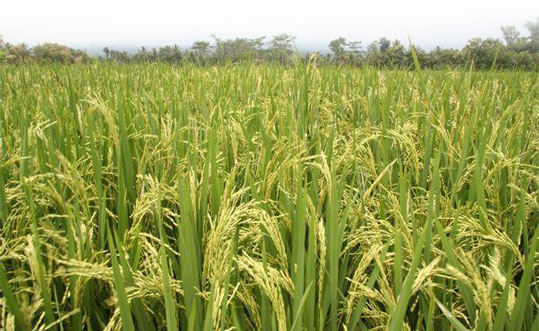Kuwaiti Farmer grow the Basmati Rice in Kuwait
 A Kuwaiti farmer has managed to grow basmati rice in Kuwait for the first time. Yusuf Al-Kirbani told KUNA, Kuwait News Agency, that despite tough conditions he has grown Indian basmati rice on his farm in the Al Wafra area.
A Kuwaiti farmer has managed to grow basmati rice in Kuwait for the first time. Yusuf Al-Kirbani told KUNA, Kuwait News Agency, that despite tough conditions he has grown Indian basmati rice on his farm in the Al Wafra area.
He said basmati requires heavy neutral soils like clay, clay loam and loamy, that are capable of holding water for longer periods, So he used cultivation basins without holes to hold water. He also attempted to produce black tomatoes and white strawberry.
*Basmati is a variety of long, slender grain aromatic rice which is traditionally from India and Pakistan. In 2014, India supplied 65 percent of the overseas basmati rice market. ‘Basmati’ derives from the Sanskrit word vasmati, meaning ‘fragrant’. It is believed to have been cultivated in the Indian subcontinent for centuries.
Kuwait News
- Events in Kuwait
- Kuwait Cabinet advises reopening some car businesses
- User Id and passwords issued to renew online residence
- Egyptian smuggles compatriots for KD 50 from Jleeb
- 22 Nurses infected with coronavirus in one Hospital
- As per SUTD, Coronavirus crisis in Kuwait will end on May 29 (AlRai)
- Recommendation added to open main mosques with precautions and grant for salaries
- MOH: Difficult to sure that work will resume normally after Eid
- Coronavirus cases in Kuwait as of 25.04.2020
- Filipino infected with coronavirus commits suicide in Amiri hospital
- 3 nurses infected with coronavirus in Kuwait
- Imprisonment for a month and a fine of 100 KD
- Coronavirus cases in Kuwait as of 24.04.2020
- Curfew shopping allowed in 36 cooperative societies (Kuwait Times)
- Total curfew update on Jleeb and Mahboula
- Partial curfew Extended in Kuwait
- Co-operative society employee infected by coronavirus
- Kuwait Flour Mills clarifies on Rumaithiya branch
- Lifting of curfew or likely to extend 2 more weeks
- Today, 28 flights will land to Kuwait
- 500 people quarantined in Hawally

Comments (1)
Filed in: All • Expats in Kuwait • Info • Local News • News









Very interesting how technology makes it possible to grow rice in such hard climate conditions